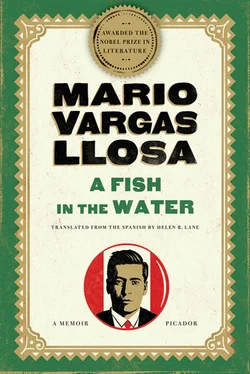Mario Vargas Llosa - A Fish in the Water - A Memoir
Здесь есть возможность читать онлайн «Mario Vargas Llosa - A Fish in the Water - A Memoir» весь текст электронной книги совершенно бесплатно (целиком полную версию без сокращений). В некоторых случаях можно слушать аудио, скачать через торрент в формате fb2 и присутствует краткое содержание. Год выпуска: 2015, Издательство: Macmillan, Жанр: Биографии и Мемуары, на английском языке. Описание произведения, (предисловие) а так же отзывы посетителей доступны на портале библиотеки ЛибКат.
- Название:A Fish in the Water: A Memoir
- Автор:
- Издательство:Macmillan
- Жанр:
- Год:2015
- ISBN:нет данных
- Рейтинг книги:3 / 5. Голосов: 1
-
Избранное:Добавить в избранное
- Отзывы:
-
Ваша оценка:
- 60
- 1
- 2
- 3
- 4
- 5
A Fish in the Water: A Memoir: краткое содержание, описание и аннотация
Предлагаем к чтению аннотацию, описание, краткое содержание или предисловие (зависит от того, что написал сам автор книги «A Fish in the Water: A Memoir»). Если вы не нашли необходимую информацию о книге — напишите в комментариях, мы постараемся отыскать её.
is a twofold book: a memoir of one of Latin America's most celebrated witers, beginning with his birth in 1936 in Arequipa, Peru; and the story of his organization of the reform movement which culminated in his bid for the Peruvian presidency in 1990.
A Fish in the Water: A Memoir — читать онлайн бесплатно полную книгу (весь текст) целиком
Ниже представлен текст книги, разбитый по страницам. Система сохранения места последней прочитанной страницы, позволяет с удобством читать онлайн бесплатно книгу «A Fish in the Water: A Memoir», без необходимости каждый раз заново искать на чём Вы остановились. Поставьте закладку, и сможете в любой момент перейти на страницу, на которой закончили чтение.
Интервал:
Закладка:
*Also widely known as La Alianza (The Alliance). (Trans. note)
*He was to demonstrate his democratic convictions once again, when he was past eighty, from April 5, 1992, on, following the “self-coup” by Alberto Fujimori, coming out publicly to wage a tenacious fight against the dictatorship.
† See “Sangre y mugre de Uchuraccay,” in Contra viento y marea, III , pp. 85–226.
*Reprinted in Álvaro Vargas Llosa, El diablo en campaña (The Devil on Campaign) . Madrid: El País/Aguilar, 1991, pp. 154–57.
*André Coyné, César Moro (Lima: Torres Aguirre, 1956).
† “En todas partes se cuecen habas, pero en el Perú sólo se cuecen habas.” (“They cook broad beans everywhere, but in Peru they only cook broad beans.”) ( Trans. note )
*Unlike the first four, whose loyalty I have no way of thanking them for, the moment we lost the elections Rocío Cillóniz hastened to put out a de luxe scandal sheet, whose goal, in the brief time that the disaffection of its readers enabled it to survive, was to serve as a mouthpiece for renegades from Libertad.
*“La revolución silenciosa,” in Hernando de Soto, El otro sendero (Lima: Editorial El Barranco, 1986), pp. xvii — xxix; reproduced in Contra viento y marea, III , pp. 333–48.
*See, as an example of de Soto’s cunning, the article in The Wall Street Journal for April 20, 1990, by David Asman, a journalist unwittingly taken in by his sly self-promotion, who attributes to him the organization of the Meeting for Freedom of August 21, 1987.
*The tally of the second round of voting for the departamento of Piura was 56.5 percent (253,758 votes) for Cambio 90 and 32.5 percent (145,714 votes) for the Democratic Front.
*In 1960, Peru occupied eighth place in Latin America; at the end of Alan García’s administration it had dropped to fourteenth.
*In the 1960s, Peru’s income per capita from agriculture and cattle raising was second in Latin America; in 1990, it was next to last, superior only to that of Haiti.
*In 1990, the book value of Peru’s one hundred largest private corporations was $1,232 million. This amount, divided equally among 22 million Peruvians, would give each person $56. (I am grateful to Felipe Ortiz de Zavallos and Raúl Salazar for these particulars.)
*Of the 20,000 deaths caused by acts of terrorism up until mid-1990, 90 percent of those killed were peasants, the poorest of the poor in Peru.
*The APRA is a specialist in this type of operation: on the eve of the launching of my candidacy, on June 3, 1989, anonymous voices phoned to warn me that there was a bomb on the plane that was taking me to Arequipa. After the emergency removal of the plane to an area of the airport far from the place where people were waiting for me to arrive, the aircraft was searched and nothing suspect was found.
*A building such as a prison, hospital, library, or the like so arranged that all parts of the interior are visible from a single point. ( Trans. note )
*Before this trip, I had had interviews with other heads of state or of government, three of them European — the German chancellor, Helmut Kohl, in July 1988; the British prime minister, Margaret Thatcher, in May 1989; the president of the Spanish government, Felipe González, in July 1989—and three Latin Americans: the presidents of Costa Rica, Óscar Arias, on October 22, 1988; of Venezuela, Carlos Andrés Pérez, in April 1989; and of Uruguay, Julio María Sanguinetti, on June 15, 1989. And I would do likewise later on with the president of Brazil, Collor de Mello, on February 20, 1990. In the publicity for the campaign we used photographs and films of these meetings to create for me the image of a statesman.
*In July 1991, at the time of the international scandal concerning BCCI, the District Attorney of New York County, Robert Morgenthau, accused Alan García’s government of having caused his country to lose $100 million by ordering that it not intervene in BCCI’s negotiations to repurchase its fourteen planes through a country in the Middle East, thereby implying that shady dealings were involved.
*I remember having had a discussion, in London, about Singapore with the writer Shiva Naipaul, who had just returned from there. According to him, that progress, the rapid modernization, represented a cultural crime against the Singaporeans, who were “losing their souls” because of it. Were they more authentic then, when they lived surrounded by swamps, crocodiles, and mosquitoes, than they are now, living amid skyscrapers? More picturesque, doubtless, but I am certain that all of them — all of the inhabitants of the Third World — would be ready to give up being picturesque in exchange for having work and living with a minimum of security and decency.
*Data from the World Bank and the International Monetary Fund.
* Oiga , Lima, February 11, 1985.
*Written in exile, from 1929 to 1930, and published in several issues of the Mercurio Peruano . The first edition in book form appeared in Paris in 1930, with a second part on Leguía’s eleven years of dictatorship (1919–1930).
† Lima: Editorial Mejía Baca, 1956.
*Jorge Basadre and Pablo Macera, Conversaciones (Lima: Mosca Azul, 1974), p. 13.
*And for truth’s sake, it must be admitted that he was to maintain that attitude until Velasco’s dictatorship expropriated La Prensa and prostituted it by converting it into a mouthpiece of the regime. Pedro Beltrán would spend the last years of his life in exile, until his death in 1979.
*Although, in his last public act as minister of foreign relations, he voted at the meeting of foreign ministers in Costa Rica in 1960 against the condemnation of Cuba, thereby disobeying instructions from Prado’s government, and as a consequence found himself forced to resign. He died shortly thereafter.
*“La fobia de un novelista,” Sí , Lima, April 6, 1987.
*I include among them Carlos Delgado, the civilian of greatest influence during the Velasco years and the one who wrote the majority of the speeches that the dictator delivered. A former Aprista and the ex-secretary of Haya de la Torre, the sociologist and political scientist Carlos Delgado resigned from the APRA when this party made a pact with the followers of Odría during Belaunde Terry’s first term as president. He backed the military revolution and contributed greatly to giving it an ideological cover, at the same time that he was the driving force behind a large part of the economic reforms — industrial co-ownership, the agrarian reform, controls and subsidies, et cetera — many of which were modeled on what had been the program for governing of the Aprista party. Carlos Delgado believed in that “third position” and his support for the dictatorship was inspired by the illusion that the army could be the instrument for instituting in Peru the democratic socialism that he defended. In Sinamos (Sistema Nacional de Apoyo a la Movilización Social: National System of Support for Social Mobilization), Carlos Delgado gathered around himself a group of intellectuals — Carlos Franco, Héctor Béjar, Helan Jaworski, Jaime Llosa, and others — who shared his position and the majority of whom, with intentions as good as his own, actively collaborated with the regime in its nationalizations and the extension of state intervention in the economy and in social life. But the criticisms that they deserve for this must be, especially in the case of Carlos Delgado, accompanied by a clarification: his good faith could not be doubted nor the consistency and openness with which he acted. He therefore always seemed “respectable” to me and I could disagree with him — and argue a great deal — without our friendship’s being broken. Moreover, it is obvious to me that Carlos Delgado did as much as he could to prevent, with all the influence he had, the co-opting by the Communists and those closest to them of the institutions of the regime and that he also used that influence to mitigate insofar as possible the abuses of the dictatorship. When the magazine Caretas was closed down and its editor-in-chief, Enrique Zileri, was persecuted, he secured me an interview with General Velasco (the only one I ever asked the dictator for) and supported me when I protested against this closing down and the persecution of Zileri and urged him to end them.
Читать дальшеИнтервал:
Закладка:
Похожие книги на «A Fish in the Water: A Memoir»
Представляем Вашему вниманию похожие книги на «A Fish in the Water: A Memoir» списком для выбора. Мы отобрали схожую по названию и смыслу литературу в надежде предоставить читателям больше вариантов отыскать новые, интересные, ещё непрочитанные произведения.
Обсуждение, отзывы о книге «A Fish in the Water: A Memoir» и просто собственные мнения читателей. Оставьте ваши комментарии, напишите, что Вы думаете о произведении, его смысле или главных героях. Укажите что конкретно понравилось, а что нет, и почему Вы так считаете.












